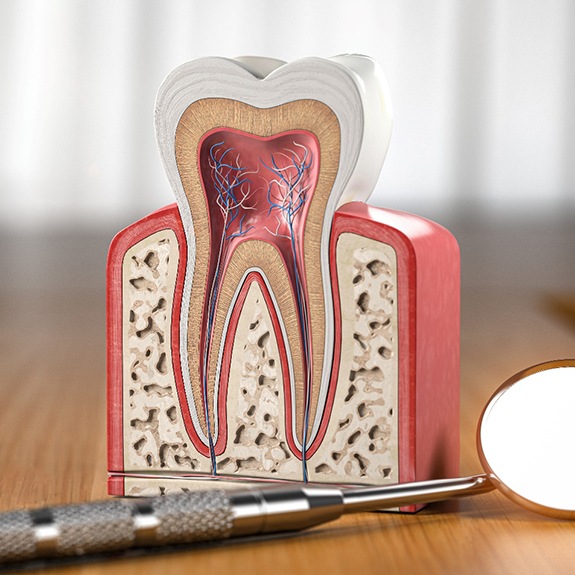Root Canal Treatment – Burbank, CA
Save Your Tooth, Stop Your Pain
Root canal treatment has a reputation for being painful. In reality, however, root canals can often be completed with minimal discomfort thanks to advanced techniques, tools, and anesthesia! Plus, our Burbank dentist, Dr. Jose-Luis Ruiz, and the rest of our team work hard to provide each patient with a pleasant and comfortable experience each and every time. If you want to learn more about this restorative dental service, you are more than welcome to reach out to us directly or read on to learn more.
Why Choose Dr. Ruiz & Associates, Inc for Root Canal Treatment?
- Dentist with Over 20 Years of Experience
- CEREC Technology Available for Same-Day Crowns
- Dental Insurance Welcome & Financing Available
Do I Need Root Canal Treatment?

If you’re struggling with any of the below symptoms, you may need root canal treatment:
- A sharp pain when you bite down.
- Dark discoloration on one of your teeth.
- Red, inflamed, or bleeding gums.
- A blister or pimple-like bump on your gums.
- Sharp sensitivity to hot and cold foods and beverages.
If any of these warning signs of severe dental damage arise, then you should contact our Burbank dental team right away so we can set time aside for you to come in for an exam.
The Root Canal Process

Of course, the first step of the entire treatment process is numbing the area of your mouth we’ll be working on so you remain completely comfortable. When it comes time to actually restore the health of your tooth, our skilled dentist will use special tools to remove the infected and injured tissues from within the tooth, clean the tooth, and fill it with a medicated material. We will then cap the tooth with a restoration, such as a dental crown, to return it to its original shape and structure.
The Benefits of Getting a Root Canal

One of the most noteworthy benefits of root canal treatment is that it saves your tooth, avoiding the need for an extraction. Additionally, this restorative dental service has a high success rate, uses lifelike restorations, and is completely painless thanks to the latest dental techniques and powerful numbing agents. It’s also worth mentioning that the entire process is relatively quick. In fact, in most cases, it only takes one or two comfortable visits to our dental office!
Understanding the Cost of Root Canals

You probably have a fair amount on your mind going into your root canal treatment, and we don’t to add to that by making payment more stressful than it needs to be. We endeavor to make the financial aspect of dentistry as simple as it can be.
Part of that is being completely transparent about the cost of care, so until we can give you a complete estimate for your root canal treatment, here’s what you should know about its potential pricing.
Factors That Can Affect Root Canal Cost

As you might imagine, the cost of a root canal can vary depending on several factors. For one, where the tooth is located in the mouth can affect the overall complexity of the treatment, as molars contain more roots than incisors.
Most of the time, root canal treatment is also finished off with a dental crown, so you should factor the cost of this restoration into the overall price of your procedure.
Finally, the person who actually performs the procedure will affect the cost. In the case of more complicated root canals, we many need to bring in an endodontist to actually perform the procedure. Such specialists have their own rates for care, so you’ll have to consult with them as well if you’re trying to get an estimate of what your treatment will cost.
Is it Cheaper to Pull My Tooth?

When only looking at the cost of the treatment itself, you might find that tooth extractions are cheaper than root canals. However, this ignores one of the most important parts of a tooth extraction: the replacement.
Leaving a gap in your smile can cause the surrounding teeth to move out of alignment, can impair your ability to thoroughly process your food, and can cause difficulties in speaking. This is why it’s critically important that you replace the tooth that you’ve lost, either with a denture, dental bridge, or dental implant.
When factoring in the cost of replacing an extracted tooth, root canals become the more affordable option.
Does Dental Insurance Cover Root Canals?

Root canal treatments are major medical procedures exclusively performed on those patients who need them. For that reason, they’re precisely the sort of thing that dental insurance is designed to cover.
While every plan is different, it’s common for them to cover anywhere from 50 to 80% of the overall cost of care. We’ll take the time to consult with your dental plan in order to ensure that you’re getting the most out of what your dental benefits have to offer.
Other Options for Making Root Canal Treatment Affordable
We don’t want you to have to forgo necessary care just because you don’t have insurance, which is why we offer alternative options for making root canals affordable.
We accept CareCredit, a third-party financier that can front the cost of your dental treatment. Over the course of several months, you can make low-to-no-interest payments until everything is paid off. This can bring otherwise expensive care into the range of affordability.
Root Canal FAQs

If you’ve never had a root canal before, you might have all sorts of questions running through your mind. Will it hurt? What happens if I wait? Is there anything I can do to avoid needing one in the future? You can find the answers to these and other frequently asked questions about root canal treatment below.
Are Root Canals Painful?
Hands down, the most frequently asked question about root canal treatment is, “Will it hurt?” Don’t worry – the answer is “no.” In fact, thanks to powerful numbing agents and the latest techniques, many patients find that the entire experience is no more cumbersome than a routine filling! Of course, if you have trouble feeling numb, you have a fear of needles, or you simply struggle with dental-related anxiety, you can always talk to our Burbank dental team about adding dental sedation to your treatment plan as well.
Can Root Canals Be Prevented?
The good news is that there are actually several ways you can dramatically reduce your chances of needing a root canal. First, commit to a solid oral hygiene routine at home, including flossing and rinsing with an antimicrobial mouthwash each evening. Second, adopt good habits, like wearing a mouthguard during sports and limiting your intake of added sugar. Third, visit us every six months for a checkup so we can treat cavities and other oral health problems in the early stages.
What Happens if You Wait Too Long for a Root Canal?
Simply put, the longer you wait to get a root canal, the worse the problem will get. In fact, there may even come a time when the infection will spread through your body and saving your tooth is no longer an option. Those are just two of the many reasons why it’s so important not to put off essential restorative dentistry.
Note: If you’re considering putting off getting a root canal because you struggle with dental-related anxiety, then talk to us about dental sedation! This calming solution can alleviate any nerves, helping you get the care you need without the stress.
Do Root Canals Make You Sick?
Back in the 1920s, a man named Dr. Weston Price claimed that root canal treatment could make you sick. Unfortunately, many patients today believe this even though the theory has been debunked for several decades now. The reality is that NOT getting a root canal when you need one can actually negatively impact your oral and overall health.
Do I Still Need a Root Canal if My Toothache Went Away?
If your toothache has seemingly gone away overnight, it’s likely because the infection has “killed” the nerve of your tooth. In other words, you still need a root canal even if your discomfort has subsided. If you’re ever unsure, schedule a time to come in for an exam. From there, our Burbank dentist can review their findings and explain why root canal treatment is essential.




